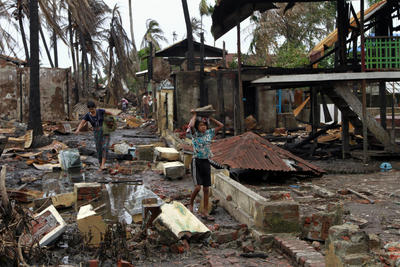The regime has set opposition leader Aung San Suu Kyi free, released political prisoners and legalised the National League for Democracy (NLD). But some critics still don’t believe that Burma will become a country ruled by civilians. The Burmese army, or tatmadaw, is able to maintain ultimate political control because it holds 25 per cent of parliamentary seats. This factor, especially, explains why the critics’ concerns are legitimate.
As Burma moves ahead with rigorous reforms, there are at least three significant obstacles to the progress of political development.
First, many observers try to define the current political situation in Burma as a struggle between the military-backed Thein Sein regime and the NLD of Suu Kyi. This is a simplistic interpretation. The situation is complicated by the central government’s volatile relationship with various ethnic minorities. This volatility — more than conflict between the NLD and the military — has the greatest potential to wreck efforts to implement political reforms. To date, the government has been unable to pacify all ethnic insurgents and, in the broader community, some ethnic groups feel they are being left out of the political process. The resultant resentment could rekindle armed conflict, which has smouldered for decades. Not even Suu Kyi has a clear policy toward national reconciliation that involves all ethnic groups.
Burma’s ethnic politics are very complex, so this lack of consensus should not come as a surprise. For this reason current ethnic conflicts across Burma cannot be neatly framed as a problem of centre and periphery.
In recent months, the state of Rakhine has been the site of deadly violence between Buddhists and the Muslim Rohingya. The fighting seems to have worried everyone but the Burmese government. Eighty people have been killed on both sides since June, following the rape and murder of a Rakhine woman and the subsequent lynching of 10 Muslims by a crowd of angry Buddhists. The ethnic crisis needs urgent attention from national leaders. If left alone, ethnic conflict could become a runaway train on course to crash into political reform.
It is clear that President Thein Sein understands the urgency of the problem. On 4 August 2012, he met with members of all political parties in Naypyidaw and urged them to work with the government to achieve ethnic reconciliation.
The second problem is the pace of change. While the government has begun to implement economic and political reform, winning praise from the international community, change has come slowly to the place where the great majority of the Burmese live: the farming heartland. To make matters worse, some reforms may produce unintended results.
Burma once led the world in rice exports but has long since fallen behind, its farming exports withering under half a century of military dictatorship. After many years of declining rice prices, inefficient farmers have been suffering sharp losses and piling up high-interest debt.
Some fear that proposed land ownership reforms could disadvantage long-term farmers and accelerate ‘land grabs’. Today, 70 per cent of Burma’s 47 million people live on farms. Most of them are poor farmers, who could be forced to migrate to urban slums if their lands are taken away. Land reform could end up creating a new underclass and a potential source of instability.
Finally, Burma has only partially achieved its goal of engaging more with the global community. Late last year, Burma requested, and was eventually granted, the chairmanship of ASEAN for the year 2014. The regime wants to show the world it is seriously pursuing political reforms, and hoping that Western governments will agree to lifting the remaining economic and political sanctions against Burma.
But the world is not yet convinced. Sanctions have not been totally abolished because Burma has been unable to solve the issue of human rights abuses. Clashes between the Buddhists and the Muslim Rohingya demonstrate that, even as some reforms progress, the human rights of ordinary Burmese continue to suffer great neglect.
Burma’s loyal friends have been too easily satisfied with the current pace of Burmese reforms, while the West is still suspicious. ASEAN and China want to rehabilitate Burma, and have joined forces to persuade Western governments to lift sanctions. But ‘great and powerful’ friends can only do so much. Ultimately only Burma itself can determine its place in the world.
Pavin Chachavalpongpun is Associate Professor at the Centre for Southeast Asian Studies, Kyoto University.

